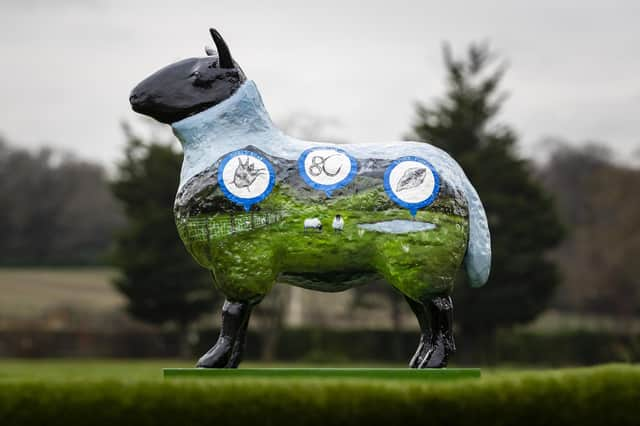Meet the Flockers: get ready for the return of the Golden Shears


The Golden Shears World Sheep Shearing & Woolhandling Championships is returning to the Royal Highland Show in June after 20 years.
Held in the MacRobert Theatre, more than 35 countries from across the world will battle it out to see who is the fastest sheep shearer and who has the best woolhandling technique.
The highly-anticipated event will feature 39 decorated sheep sculptures that are currently on tour across Scotland in the Flock to the Show public art trail.
The Scotsman is the media partner for both events and the Royal Highland Show is held from 22 to 25 June.
Visit the website at royalhighlandshow.org
Meet the artist
Eilidh Geddes grew up in Caithness and is an artist and PhD student who has been creating realistic animal portraits for more than a decade. Eilidh moved to Glasgow to complete a degree in veterinary Biosciences followed by a Masters researching sheep scab, a parasitic disease. She is pursuing a PhD at Moredun Research Institute, in Midlothian, investigating sustainable parasite control on Scottish hill and upland sheep farms.
Emma said: “A Land of Parasites depicts the contrast between our picturesque landscapes and the hidden parasite challenge that lies within. Parasite control is a challenge for all livestock farmers as they have a significant welfare and economic cost to the sheep industry.
“The design depicts three parasites of major importance to the sheep industry – sheep scab, roundworms, and liver fluke – and demonstrates where they are commonly found within the landscape.”
A Land of Parasites
A Land of Parasites by Eilidh Geddes highlights the importance of worms in maintaining healthy soil and promoting plant growth. They help to decompose organic matter, and create channels for water and air to penetrate the soil. Worms also contribute to nutrient cycling, creating a rich fertile soil that supports a range of plant and animal species.
Worms and soil health are essential to Scottish agriculture, playing a critical role in promoting soil health by improving soil structure, nutrient cycling, and water retention. This benefits plant growth, reduces erosion, and promotes carbon sequestration, helping to mitigate climate change.
Healthy soils support biodiversity and provide habitats for wildlife. In agriculture, healthy soils support sustainable farming practices, increase crop yields, and reduce the need for chemicals.
Overall, worms and soil health are critical to environmental, economic, and social wellbeing.
Meet the sponsor
The Moredun Foundation is a registered charity supporting livestock health and welfare through research and education. Formed by farmers in 1920, it is dedicated to improving the understanding, treatment and prevention of infectious diseases by developing a variety of outreach programmes for farmers, vets and the general public; and supporting a varied range of research initiatives.
They said: “Moredun has always maintained a close working relationship with the farming community. We continue to be very active in this area of knowledge exchange to ensure that our research remains rooted in the practical needs of livestock farming today. We think it is vital to engage with people about the importance of the many contributions made by agriculture and the rural industries to the health and wellbeing of people and our environment.”
Find your fleece
Locate today’s sheep and access our VIP competition to win free parking, hospitality, and lots more by following this link.